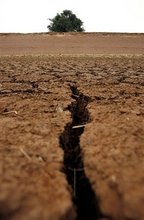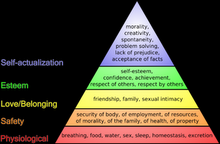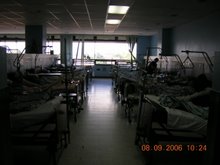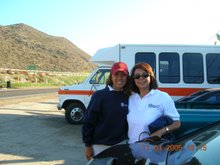There's something I'd like to mention. There is a unique way to think about the approach of public health professions and that is as damage controllers, in the case where they are in the world treating preventable conditions such as AIDS victims, when the world already has a epidemic on their hands. The second approach to public health is to deliver prevention to those who need it, like the people who are becoming obese, which is a risk factor for developing heart disease, diabetes, and cancers. Most of the PH people I talk to imagine that they will spend their careers preventating the onset of diseases through awareness and education.
But education and awarness simply isn't enough. People don't typically proact - they react. People get haircuts when their hair is too long, they don't get their haircut 2 months before it needs cutting. Many people think of their health the same way... they don't need to exercise - they look attractive, healthy, why worry?
I think as PH professionals we need to change the way insurance programs work, and maybe implement an idea where when people come into the office and they show precursor signs of disease, they should be enrolled in modifiable lifestyle programs. Impossible I'm sure, but it's my two sense anyway.
Great quote:
"The Superior Physician prevents sickness;
The Mediocre Physician attends to impending sickness;
The Inferior Physician treats actual sickness."
- Traditional Chinese Proverb
Graphic reference: Smegma (foreskin) increases cancer in women.
Presentation Info: I even gave a presentation, with my lovely class mateWilson, on cardio vascular disease - and in the process of doing research I found some great information on the National Geographic website plus the video we used in our presentation. http://www7.nationalgeographic.com/ngm/0702/feature1/

















5 comments:
Alexis, I agree that we should modify lifestyle before the onset of obesity and diabetes, unfortunately our health systems and society in general do not necessarily support proactive measures because there's no money to be made. So it's up to us in pubic health to think of new and creative incentives to get people to look at their unhealthy behaviors before they exhibit symptoms of CVD. I don't know how much we can do to change the insurance framework in this country, however, we've given them too much power and we lack the political will to make such huge shifts. At least for now. Just my two cents worth.
Alexis, I loved your hair cut analogy... I agree, education isn't enough because the truth is that it is easier to react to a situation after if happens... education helps form the building blocks for a person who will know when it is essential to be proactive. I like your perspective.
I think you are absolutely right about the need to reinvent the way insurance programs work in this country. I think the only way this can be accomplished is by targeting the policy makers in order to pressure or force insurance companies to change their ways. However, this will take a lot of investment on our behalf, because of how powerful and influential insurance companies have grown in the US. So long as insurance companies keep making money, there is going to be no incentive for them to rethink the way the companies work, and like Alexa pointed out there really isn't any money to be made in preventative health. I think, however, that as our profession realizes how necessary it is to cause a major change in the way insurance companies work in this country we will be able to unite and cause change to happen at the policy level.
Alexis, I like your blog! The website is amazing!
Nice quote girly!
Well I think as PH professional we should educate people about prevention methods. Warning them about symptoms, risks and signs of various diseases is also essential. Emma once mentioned in class that other nations try to copy our delicious fast food, on the other hand media shows how fitted and good looking we are! I think we should BE HONEST to ourselves, others. As a developed country and role model illustrate to other nations a mid point, balance life!
Have the healthy food, consume vegetables, exercise regularly but if you crave fast food often it is OK to consume that! Not a crime…
Again starting point for education varies in different areas of the world! I hope that we all together can work hard and a “possible outcome”/ “impossible situation”!
alexis, great presentation. I also think that being proactive is key to implementing a successful PH program. We take classes listed under Preventive Medicine and in order for us to be preventive, we need to be proactive.
Post a Comment